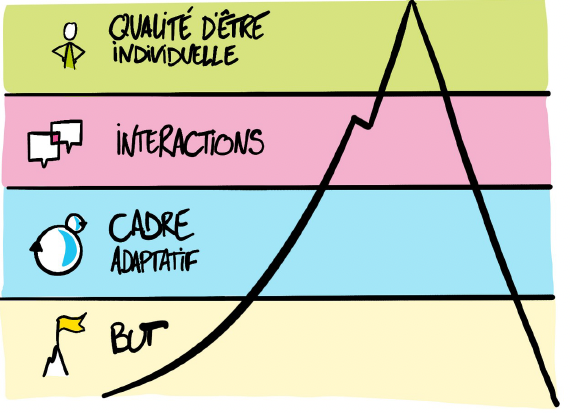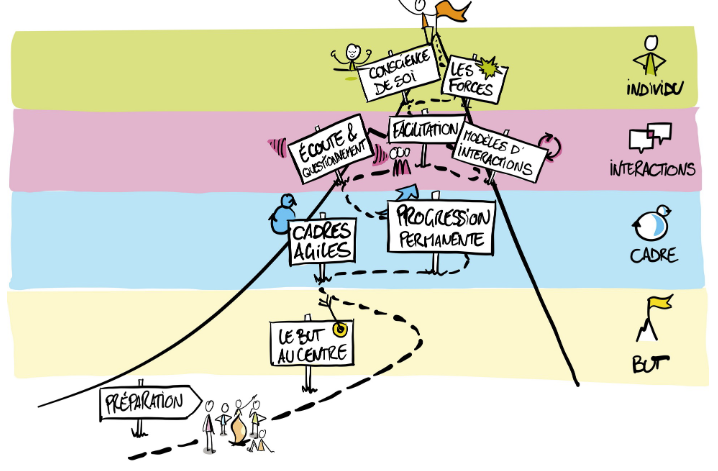Training catalog
Team coaching path
Develop “teamwork” through meaning, agile, quality of interactions and individual progress.

As coachs, we feel that the principles, skills and practices we are constantly discovering are increasingly useful in a world of growing complexity. This observation made us want to share them with anyone who is convinced that the key to a successful organization lies in the quality of teamwork.
Overall and operational objectives
The overall objective is to be able to develop a team’s or organization’s ability to work as a team in order to calmly tackle increasingly complex issues.
At the end of the training, you will be able to:
– To set up a development path for a team or an organization wishing to develop its capacity to self-organize in order to reach a complex goal (project, mission, …),
– Build and lead each phase of this development by implementing tools, practices, formats appropriate to the team, its context and in line with your sensitivity as a coach,
– Adopt a clear, modeling posture, supporting the change you are accompanying and in phase with your color as a coach.
Content and procedure
Prepare your trip
What will tell me that my trip will be successful? What quality do I want to embody in order to enjoy it fully? What convictions guide me? Are there any other questions I should be asking myself at this stage? Who is around me and how will I be able to rely on them?
These questions are essential to prepare for the journey in this program, and are also fundamental to start a team coaching … And so many answers to begin to define his color of companion.
Main goal of the step: to light the spark, to invite everyone to join the group as they are, to connect the participants.
Main references discussed: success criteria, principles for starting up support.
Drive by the goal
We can only team up if we have a clear shared goal to help us put our energies together and move in the same direction. How to formulate a clear goal? How do we align our decisions and actions with this goal?
Main goal of the step: to know how to formulate and use a clear and motivating goal.
Main references discussed: The Golden Circle, success criteria, theory of constraints.
Addressing complexity with agile frameworks
Team building is easier to learn if our framework is adapted to the complexity of our environment and if it allows us to adapt according to the lessons learned. We will understand together what the agile approach proposes to help us achieve complex goals and what it implies deeply for organizations and individuals.
Main goal of the step: to understand the purpose of agile frameworks and what they can bring to teams.
Main references covered: Cynefin model, Agile Manifesto, Scrum.
Create and maintain the conditions for improvement
The coach helps the team to make its inspection-adaptation cycle come alive by leading it to develop its problem-solving capacity. In this module, we will address:
– The subtleties of retrospective facilitation,
– Problem solving approaches,
– The use of success criteria to help the team assess its progress.
Main goal of the step: to move with ease in the “Don’t be Good, get Better” paradigm.
Main references covered: Agile Retrospectives, Appreciative Inquiry, Systemic Approaches, The 5 Dysfunctions of a Team.
Listen and challenge
A coach helps a team to move forward by identifying the key points for them and challenging them on these specific points. This requires developing a great quality of listening, then knowing how to invite without blocking:
– Develop the art of questioning,
– Know how to give constructive feedback,
– Challenge team building with disruptive practices that promote team building.
Main goal of the step: to develop listening and questioning skills.
Main references covered: powerful questions, the art of feedback, Liberating Structures.
Facilitating generative and involving exchanges
Most of the coaching phases take place in team sessions where the coach plays the role of facilitator.
The richness of these moments is essential for the progress of the team and the coach must therefore develop advanced facilitation skills:
– Designing adapted and varied group times,
– Find your posture as a facilitator-accompanist.
Main goal of the stage: learn to connect intelligences.
Main reference materials covered: Liberating Structures, Thiagi, Game Storming, Integral Facilitator.
Equip yourself to better read and act on interactions
Teamwork is about improving one’s ability to deal with difficult issues while maintaining a high level of listening and taking into account the diversity of points of view.
The coach must learn how to approach sensitive topics with the group in a gentle manner, and helps the team gain the confidence to do so on their own.
In this module, we explore:
– Communication models to improve communication on sensitive topics,
– Simple formats and models to help the team become aware of what is at stake in their interactions and progress in their ability to dialogue,
– The options available when faced with difficult situations.
Main goal of the step: to have benchmarks to better understand and act on interactions.
Main references covered: Virginia Satir, Transactional Analysis, NVC.
Build on strengths and those of others
A coach develops his full power when he discovers, develops and learns to use his own talents in the service of the teams he coaches, and when he manages to surround himself with people who will bring strengths that complement his own.
This step aims to:
– Become fully aware of your strengths,
– Understand how to organize your support to complete them by surrounding yourself.
Main goal of the stage: to develop one’s color as a companion.
Main references covered: Strengths Game, Appreciative Inquiry.
Project myself into the future
Personal change, change for the team(s) I am/will be accompanying, how do I situate myself on this path? How can we help teams to situate themselves? What will be my next step(s)?
Main goal of this step: to take the first steps in a strategy to implement the knowledge acquired during the course.
Main references addressed: closing a coaching.
Technical means
- Virtual room with synchronous assistance, in ZOOM video conference, for live discussion
- Projected training materials
- Virtual collaborative WALL chart where everyone can write
- Theoretical presentations
- Study of concrete cases
- Indoor quiz
- Provision of online support documents following the training
